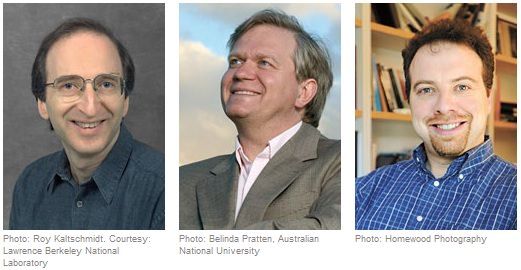The Nobel Prize in Physics 2011 has been awarded “for the discovery of the accelerating expansion of the Universe through observations of distant supernovae” acknowledging the amazing discovery announced in 1998 that — based on the measured velocities of Type 1a supernovae — the rate of the universe’s expansion is increasing over time. The prize will be shared by three astronomers, now officially ‘outstanding in their field’, Saul Perlmutter of UC Berkeley, Brian P. Schmidt of the Australian National University and Adam G. Riess of Johns Hopkins University.
Announced on Tuesday 4 October 2011, this was the second of this year’s Nobel prizes awarded. On Monday, the Nobel Prize in Physiology or Medicine went to Bruce Beutler, Jules Hoffmann and Ralph Steinman (sadly deceased).
The Nobel prizes are handed out annually for achievements in science, literature, economics and peace. All but one of the prizes (economics) were established in the will of the 19th century millionaire Alfred Nobel, who made much of his fortune from the invention of dynamite.
The Nobel prizes have been awarded since 1901. Each prize consists of a medal, a personal diploma and a cash award of 10 million Swedish kronor (about 1.46 million U.S. dollars). The economics award was established by Sweden’s central bank in 1968.
Half of the cash component of the 2011 Nobel Prize in Physics will go to Perlmutter who is reported to have first commenced work on determining cosmological expansion from supernovae data in 1988. Schmidt who headed another team commencing similar work in 1994 and Riess who made a key contribution to that team will share the remainder.










Comments are closed.